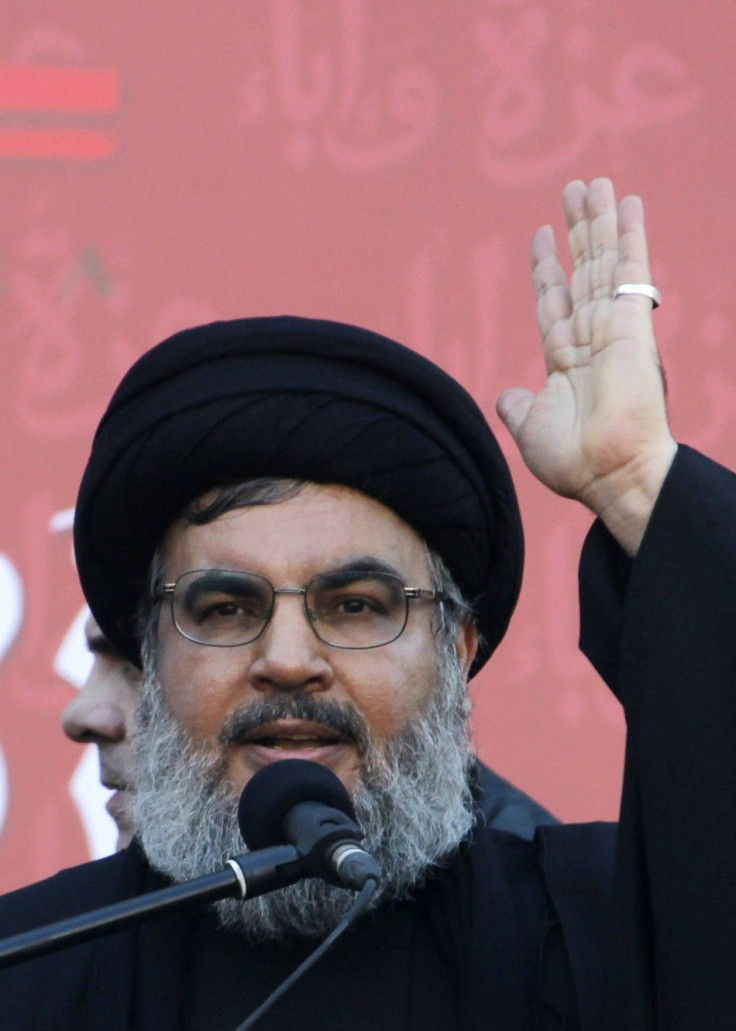Amid Rumors And Bad Omens For Lebanon, Hezbollah Attempts To Set The Record Straight

Rumors are flying in Lebanon, and Sheikh Hassan Nasrallah is having none of it.
Nasrallah is the leader of Hezbollah, the Shiite militant and political group in Lebanon. He made a rare television appearance Wednesday evening to dispute three separate claims made by detractors.
The first rumor had to do with his health. A Lebanese radio station called Sawt Beirut, aligned with domestic political foes of Hezbollah, had been reporting that Nasrallah was suffering from cancer and had traveled to Iran for treatment.
“The rumors spread in recent days made me hold an urgent media appearance to show you that I am in good health,” said Nasrallah in his address. “I’m here in person to tell you that these rumors are baseless.”
The second rumor had to do with Hezbollah’s role in Syria. It is widely believed that Hezbollah -- whose military wing is sophisticated and well-armed -- has been training the Syrian military and even sending soldiers of its own to back the regime of President Bashar al-Assad, which has been engaged in a 23-month conflict again opposition fighters.
But Nasrallah stood by his official line, telling his audiences that Hezbollah supports Assad but is not actively involved in the Syrian conflict.
The third rumor was the most dramatic; it had come to light earlier on Wednesday. According to several media outlets, rebel fighters in Syria claimed to have killed Naim Qassem, Nasrallah’s deputy and Hezbollah’s No. 2 official. Such an event could have been cataclysmic; it would dramatically increase sectarian tensions in Lebanon, threatening to plunge the Mediterranean country of 4.3 million people into chaos. It would also heighten animosities between Hezbollah and the rebel Free Syrian Army.
But the reports remain unsubstantiated. Hezbollah officials have denied them, and Nasrallah also denied them in his speech.
Taken altogether, these three rumors -- and the Hezbollah’s ardent denials of each -- only serve to highlight Hezbollah’s increasingly dire situation.
In Lebanon, Sunni and Shia Muslims have had a volatile relationship for decades; the situation came to a head during the bloody civil war of 1975-1990, which killed about 120,000 people. The country has become a microcosm of the Sunni-Shia divides that have lately been exacerbated all across the Middle East. Hezbollah has close ties with predominantly Shia-run entities, including the regimes of Iran and Syria. Iran is Hezbollah’s primary benefactor, but Syria lies between these two allies and has been an important conduit for Iranian funds and weaponry.
If the Assad regime falls to the largely Sunni revolt, Hezbollah will be surrounded by enemies -- and not just in Syria. The militant organization also has an extremely tense relationship with its southern neighbor, Israel. The last military conflict between the two was in 2006, when Hezbollah rocket fire prompted a swift Israeli response. The 34-day clash devastated communities in southern Lebanon -- after it was over, Hezbollah swooped in with funds and infrastructure repairs, which helped to shore up its support in the region.
If such a conflict were to erupt again, it would likely be even more deadly. Hezbollah has grown even stronger since 2006, thanks in large part to hundreds of millions of dollars in funding and tens of thousands of rockets and missiles from Iran.
Without Assad in power, the Iranian support that Hezbollah has grown to depend on would be more difficult to access. It would leave Lebanon more vulnerable to Israeli forces from the south, in addition to creating a whole new enemy to the east.
Such a scenario could turn Lebanon -- a financial hub and tourist spot whose capital once was hailed as the Paris of the Middle East -- into a pariah state, leaving Lebanese Sunnis in peril as long as Hezbollah remains in power.
Following a round of parliamentary elections in 2009, Hezbollah shared a coalition government with the Sunni-backed Future Movement led by Saad Hariri. But the union fell apart in 2011, due to tensions over investigations into the 2005 assassination of the prime minister’s father, Rafik Hariri, whose own tenure as prime minister ended a year before his death. Many Sunnis blame Hezbollah for the assassination.
Saad Hariri went into self-imposed exile after the government fell apart, leaving a vacuum at the highest levels of Sunni political leadership. Hezbollah now maintains control of the government, but new elections are scheduled for this year.
Unsurprisingly, the upcoming poll is a subject of much contention. Various Lebanese political and religious groups are debating an electoral rule change, which Nasrallah addressed during his speech on Wednesday. He proposed a plan whereby half of all MPs elected would be Muslims and half would be Christians, according to Moqawama, a pro-Hezbollah website.
"An electoral law based on proportional representation and a single electorate district would prevent extremism and achieve justice, equality and national unity for all the Lebanese,” he said. But such a scheme does not appear offer much in the way of electoral protections for Sunnis or Shias particularly.
With a major vote coming up, Syrian rebels getting closer to ousting the Assad regime, and the potential for disruption in Lebanon’s connection to Iran -- which is increasingly cash-strapped under international sanctions as it is -- Hezbollah officials have a lot to worry about.
But Nasrallah took the opportunity to sound a more positive message on Wednesday evening.
“We all should exert effort to preserve the country, and the state should carry its responsibilities,” he said. “We hope that all sides carry their share of responsibility.”
© Copyright IBTimes 2024. All rights reserved.






















